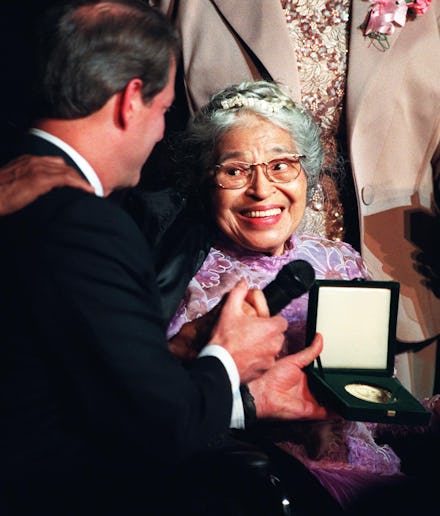Rosa Parks' Refusal to Move on a Bus Was Not the Beginning or End of Her Activism

You probably know her from elementary school. She's the woman, tired and defiant, who refused to give up her seat to a white passenger on a Montgomery, Alabama, bus, breaking Jim Crow laws and spurring the Montgomery bus boycott, a major moment in the civil rights movement. But Rosa Parks is more than that. Sixty years ago, on Dec. 1, 1955, Parks carried out the action for which she is now famous.
But there's a larger story to Parks' life.
Parks was an active member of the NAACP.
Parks was the secretary of the National Association for the Advancement of Colored People's Montgomery chapter for years before she took her seat on that bus. In fact, Parks' refusal was not because she was tired from her work as a seamstress — it was a bit of pre-planned activism that she concocted with the NAACP.
As Gwen Ifill suggested to Jeanne Theoharis, author of The Rebellious Life of Mrs. Rosa Parks, in an interview with PBS Newshour, "Rosa Parks, with her straw hats and her church lady clothes and her demure attitude and her maternal aspect, was a far more preferable face to put on [the movement], wasn't she?"
Parks trained young activists in an effort to desegregate Alabama libraries.
Before taking on the role as secretary, Parks was the youth leader of the NAACP's Montgomery chapter. Her work included training young activists to engage in acts of civil disobedience.
During the Jim Crow era, even libraries were segregated by race, with some books at white libraries not being available at black libraries. While working for the NAACP, Parks organized black students to ask for library books for material for school papers. When they were told the book was not at the black library, which meant it had to be shipped to them, they would go to the white libraries and demand the books. Though they attempted multiple times, the students never successfully withdrew a library book from a white library.
Parks worked in politics too.
Shortly after spurring the Montgomery bus boycott, Parks moved to Detroit, where she helped elect John Conyers, a black politician, to Congress. Conyers joined the 89th Congress — the "most productive in American history," according to the Washington Post — the Congress that passed Medicare and Medicaid, the Voting Rights Act, the Higher Education Act and the Freedom of Information Act. Conyers hired Parks to work in his office as an administrative assistant after his victory in 1965. She remained in Conyers' employment until 1988.
Upon her death in 2005, Conyers said:
"As the mother of the new civil rights movement, she left an impact not just on the nation, but on the world. And while she was an apostle of the nonviolence movement, Mrs. Parks never saw herself that way. She never sought the limelight and was never really a political figure at all. It was important to her that people understand the government and to understand their rights and the Constitution that people are still trying to perfect today."
Parks fought for labor unions.
For Parks, the labor movement and the civil rights movement were not separate. According to Theoharis, Parks "had a longstanding relationship to labor justice." When she became secretary to E.D. Nixon of her local NAACP chapter, she also began working with his railroad porters union, which aimed to organize black workers and get them the right to vote. According to Theoharis, Parks also corresponded extensively with the National Negro Labor Council throughout her life and continued working with grassroots labor activists even after she moved to Detroit.
Parks joined the 1968 Memphis sanitation strike. In 1990, at the age of 77, she joined Jesse Jackson and union Greyhound bus drivers in a march in Washington, D.C., to help contract negotiations and to counter the efforts of Greyhound's union-busting chairman Fred Currey.
Sixty years ago, Parks, now known as the mother of the civil rights movement, sat down on a Montgomery bus and refused to move, but her story was more than that one courageous act. Hers was a lifelong dedication to justice. In 1999, she received the Congressional Medal of Honor, which is the highest honor a nonmilitary person can achieve in the United States. Thousands attended her funeral, including Bill and Hillary Clinton and Aretha Franklin. And they didn't attend because of a moment of activism, but because of a lifetime of justice work.